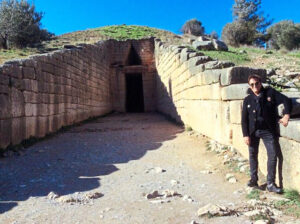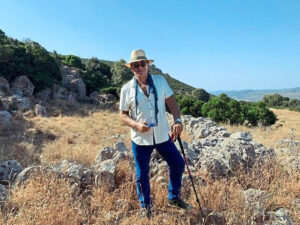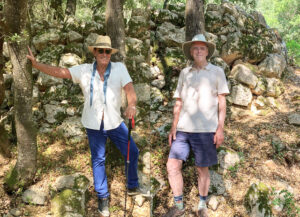Thaao Penghlis pours his lifelong passion for archaeology and all things Greece into the new podcast, The Lost Treasures. The adventure story explores The Iliad and The Odyssey through the life of German archaeologist Heinrich Schliemann, who changed history when he discovered the real-life locations and treasures in the epic poems. Written and narrated by Penghlis, the four-part podcast — three story chapters enhanced with immersive audio effects and a fourth that features a reading from Penghlis explaining why he embarked on it — draws on the actor’s exclusive access to 60,000 pages of long-hidden documents and diaries.
Soap Opera Digest: You always dreamed of becoming an archaeologist. Is this podcast your way of delving into that world and satisfying that dream?
Thaao Penghlis: Absolutely. To this day, if I ever give a big round of applause and thank you to DAYS OF OUR LIVES, it’s that it has afforded me the journeys that I’ve taken and to explore the areas that as an archaeologist I would have been digging into. That would have been Greece and Egypt. It’s been a wonderful ride. We’re here in many ways to establish a journey from beginning to end. So with the podcast, I thought, “What is the most enticing story I know?” That was when I read The Iliad and The Odyssey, about Odysseus and what happened after the Trojan War and his journey back home. This is my Ithaca.
Digest: Your research for this actually began when you visited the National Archaeological Museum in Athens, correct?
Penghlis: Yes. When I walked into the museum in Athens, the guy who was in charge of entrances and exits recognized me from MISSION: IMPOSSIBLE. He gave me this huge hug and said, “We love you and what you’ve done for Greece. What can we do for you?” I said, “I’d like to meet the Minister of Culture.” Because of that, I got to visit a library containing the Schliemann documents — 60,000 of them. They allowed me to look through them for two weeks. Then I went to his palace that was shut down for quite a few years. I was able to walk through the palace and kind of relived how he must have lived. Twenty years ago that began my trail of Schliemann.
Digest: What’s your purpose in telling these stories of The Lost Treasures?
Penghlis: My purpose in telling these stories is to romance my audience, inspire them with the notion that “Gods of Men” once walked in these lands of my ancestors. All I heard about when I was growing up was, “Greece, Greece, Greece.” And I was going, “Oh, I’m so tired of it.” But in the end, it became the focus of my life. It was Greece and how the language of Greek still remains and the fact that when I go back I feel at home. That country is part of my heritage.
Digest: What inspired you to do this podcast now?
Penghlis: When you reach my stage, you realize you’ve had a life well lived. And why not share that? That’s why I wrote the book, Places, so my family had a history of some of the journeys I’ve taken. Also, the podcast is the same vein. I wrote and recorded it, and [production] put in sound effects, which really are great. I wrote this podcast because of all the things that have taken place while I was journeying along the way. The true essence of this is what happened when I was exploring Alexander the Great. I went to Alexandria. Schliemann, who discovered Troy, also had gone there. There was a mosque called [El Nabi] Daniel Mosque. I walked in and a man asked what I was doing there. What was I interested in? I noticed that there was a hole in the ground of the church. I gave him $20, and he said to me, “Would you like to see what’s beneath this?” I said, “Sure.” So he put down a ladder. Within 10 seconds, I walked down and went from 21st century Alexandria to first century Alexandria. It was amazing. Why did I do this podcast? That’s what gave me the idea.
Digest: Schliemann’s documents and diaries are something you are obviously fascinated with. Do you think you were able to convey that fascination to the audience?
Penghlis: Yes, because how do you explain that a man called Schliemann was digging in the dirt after 3,000 years, came upon a body of an ancient king, a warrior with a mask on his face made of gold, his sword made of a gold handle, gold jewelry and everything? Then you take the mask off and right in front of you, you see what he looked like and within seconds the whole thing turned to dust? That, to me, the way you explore that and talk about it … it’s his love story. He always said that he wanted to marry a Greek woman. Why? Because he wanted a Helen of Troy by his side. Then he found the treasure of Troy. It’s a romantic story. He had a lot of obstacles, especially by the Turks, who said, “Is it gold you’re searching for?” He said, “No. I’m searching for your history.”
Digest: This is a brand-new medium for you. Were there any difficulties embarking on it?
Penghlis: Well, no. When I wrote it, I was writing short stories. I happened to mention it to my agent, and he said, “Why don’t you record it?” Because I had a manager in Canada who kind of, in a way, gave up. So I spoke to my agent, and he said, “Well, why don’t we record it here?” I asked what the process was. I wrote some of these stories two years ago. It’s taken a long time for them to be recorded and also to be installed with sound effects.
Digest: It’s different from acting, obviously. Were there any challenges?
Penghlis: It’s another element. Isn’t it interesting that they always say, “If you really want a longer life, be curious”? In many ways, not having been on DAYS for a while gave me this [opportunity] not to waste my time, but [to think], “What can I make of it? Were there obstacles?” Time. Reading your own material in one take. I mean, you’re talking about 18 pages, 25 pages, then making it interesting enough for the audience. Being a storyteller isn’t something people are gifted with always. People have too many bridges in their conversations, if you’ve noticed when they’re telling a story. And you want to go, “So what happened? What happened?”
Digest: How does doing a podcast compare to acting?
Penghlis: It is acting. The only difference is I wrote it. As an actor, you’re usually acting other people’s dialogue. This one was my own. So I knew the pace. I knew what to hold onto when I was discovering a moment.
Digest: Would you consider doing more podcasts in the future?
Penghlis: Yes. I have ideas for the next one. I want to do the French king and the last dauphin of France. That’s a phenomenal story. Did he escape the tower or did he die in the tower? And how they proved what happened in 2002. I also want to tell the great love stories through the century. There are 12 of them that I’ve picked out, and I want to tell those, because love stories are always tragic.
Digest: Did you learn anything about yourself from doing this?
Penghlis: Yes, that I’m a smart cookie [laughs]. That I was blessed being a producer of my own life. I’ve been depending upon other people’s dialogue for years. Some was great. Some was not. But it’s your responsibility to make something beyond what they expect. That’s the test of daytime and nighttime. Even with [the TV series reboot of] MISSION: IMPOSSIBLE, the first few episodes [remade] episodes from the ’70s, because there was a writers’ strike.
Digest: Obviously, you like this medium.
Penghlis: I do like it, because there’s no makeup. There’s no getting ready. It’s not wearing a costume and all those elements of your appearance. There’s nothing greater. I think that’s why actors do voice-overs. Then you get into a whirl within a room that echoes as you’re speaking, a whirl that you’ve created. That is an amazing thing. It’s like, “How did you create your own home and the energies, and what is the atmosphere?” You do that through the voice and the language you’ve expressed. There’s something beautiful about starting something from scratch. Anything. It’s like a recipe. You start something from the beginning, you are in charge of it. You have the time and the intellect, hopefully, and the knowledge of having experienced it. Then you write about it, about the people who cross your path and make a difference and those who have remained part of that path, because in many ways they reflect the kind of interests and appreciations you have of life. For me, the podcast is like the final episode in my life. I’m my own boss. I don’t have to wait for someone to say, “5, 4, 3, 2, 1 and go.”
Digest: Would Tony DiMera listen to this podcast and, more importantly, do you think he would enjoy it?
Penghlis: With a gun to his head [laughs]. Actually, it would be Tony holding a gun to Andre’s head. Remember the early days: Andre, on the run, did all these Shakespeare parts, and he was a bit of a fool. I think Tony would have great pleasure holding a gun to Andre’s head and saying, “Either you read this and get to understand it, or I’m going to lock you up forever.” I think in many ways it would be like the old days of Tony and Andre and the battle between them.

“Trojan ruins in 13th century BC in Hisarlik, Turkey.”

“Standing outside of Eumaeus’s pig farm where Ulysses returned after the Trojan War and hid, disguised as a shepherd, in Paliki, Greece.”

“This is John Crenshaw, the man who showed me the new explorations on the island of Kefalonia.”
The Lost Treasures will be available on all major podcast platforms, including Spotify, Apple Podcasts, Google Podcasts, Amazon Music and iHeartRadio, on Tuesdays every two weeks, beginning on September 5, and concluding with its fourth installment on October 17.







